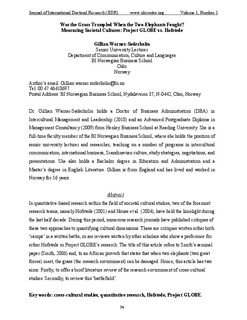Was the grass trampled when the two elephants fought? Measuring societal cultures: project GLOBE vs. Hofstede
| dc.contributor.author | Warner-Søderholm, Gillian | |
| dc.date.accessioned | 2013-05-21T10:48:14Z | |
| dc.date.available | 2013-05-21T10:48:14Z | |
| dc.date.issued | 2012 | |
| dc.identifier.issn | 2328-0832 | |
| dc.identifier.uri | http://hdl.handle.net/11250/93918 | |
| dc.description | This is an open access journal | no_NO |
| dc.description.abstract | In quantitative-based research within the field of societal cultural studies, two of the foremost research teams, namely Hofstede (2001) and House et al. (2004), have held the limelight during the last half decade. During this period, numerous research journals have published critiques of these two approaches to quantifying cultural dimensions. These are critiques written either both ‘camps’ in a written battle, or are reviews written by other scholars who show a preference for either Hofstede or Project GLOBE’s research. The title of this article refers to Smith’s seminal paper (Smith, 2006) and, to an African proverb that states that when two elephants (two great forces) meet, the grass (the research environment) can be damaged. Hence, this article has two aims: Firstly, to offer a brief literature review of the research environment of cross-cultural studies. Secondly, to review this ‘battlefield’. | no_NO |
| dc.language.iso | eng | no_NO |
| dc.publisher | International Doctoral Research Centre | no_NO |
| dc.subject | cross-cultural studies | no_NO |
| dc.subject | quantitative research | no_NO |
| dc.subject | Hofstede | no_NO |
| dc.subject | project GLOBE | no_NO |
| dc.title | Was the grass trampled when the two elephants fought? Measuring societal cultures: project GLOBE vs. Hofstede | no_NO |
| dc.type | Journal article | no_NO |
| dc.type | Peer reviewed | no_NO |
| dc.source.pagenumber | 74-96 | no_NO |
| dc.source.volume | 1 | no_NO |
| dc.source.journal | Journal of International Doctoral Research | no_NO |
| dc.source.issue | 1 | no_NO |
Tilhørende fil(er)
Denne innførselen finnes i følgende samling(er)
-
Scientific articles [2173]
